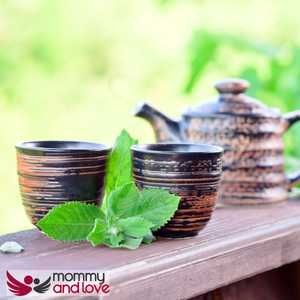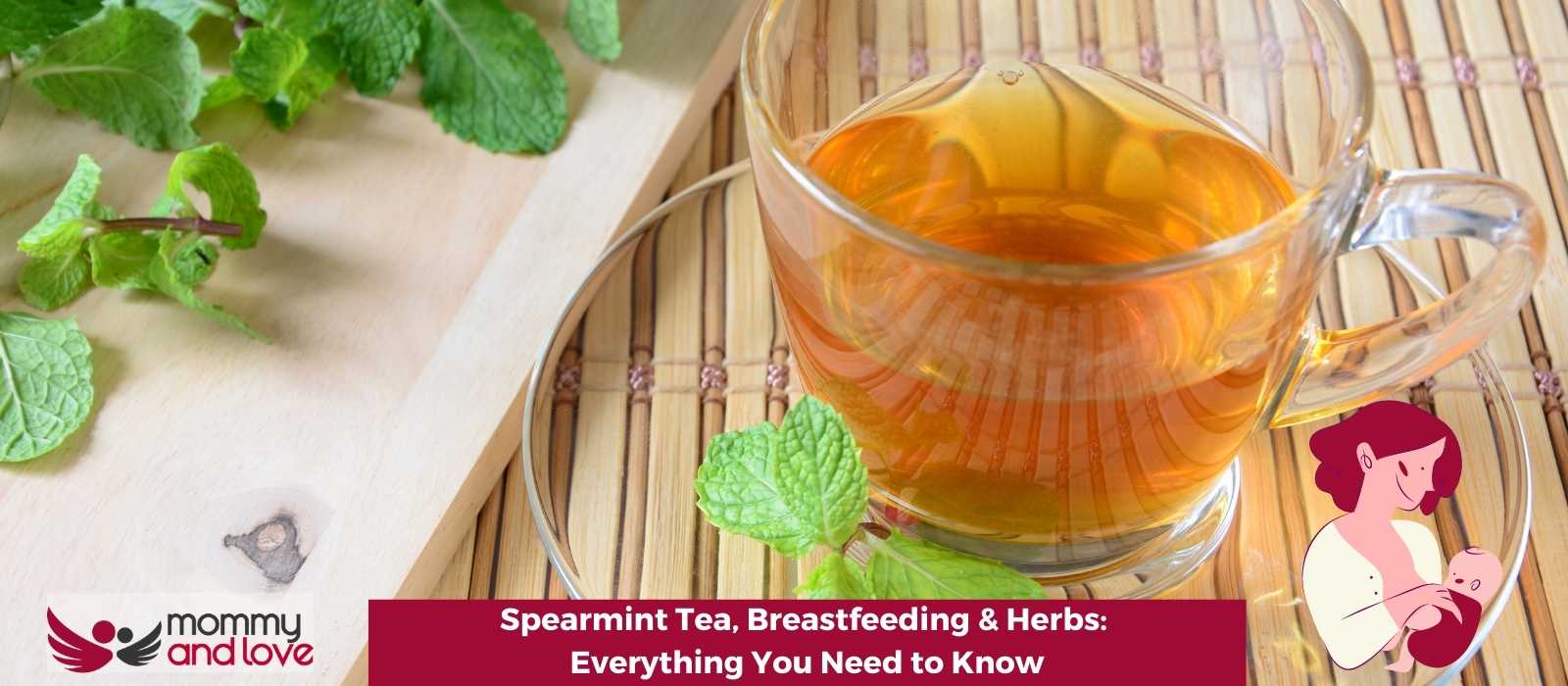If you are a nursing mother, you may be wondering if drinking spearmint tea is safe. Can it help increase your milk supply?
In this guide, we will discuss everything you need to know about peppermint and spearmint tea as well as other herbs. We will cover the benefits of drinking spearmint tea while breastfeeding, as well as the potential risks. Keep reading to learn more!
What Are Spearmint and Peppermint Used For?

Peppermint (Mentha piperita) and spearmint are chemically similar, with menthol content as the main difference between the two.
Peppermint has 40% menthol while spearmint has less than 1% menthol. This means spearmint has a milder taste than peppermint.
Spearmint and peppermint is a popular herb that has a long history of use in many different cultures. Peppermint (Mentha piperita) which contains methyl salicylate is used for a variety of reasons, including menstrual cramps, skin irritation, and to treat oversupply of milk during weaning.
There are many different ways to use peppermint. It can be taken in capsule form, or the essential oil can be added to a diffuser. Peppermint can also be brewed into peppermint tea or applied topically to the skin.
Peppermint oil has been used to treat cracked nipples.
Is Mint Safe During Breastfeeding?
Peppermint and spearmint are two common types of mint that can drop milk supply from your breasts. If you are breastfeeding and thinking about using mint, talk to your healthcare provider first.
Eating peppermint gum, candies and menthol cough drops, especially in very large amounts, can decrease milk supply. Additionally, it has been shown that peppermint tea can interact with certain drugs.
So while the occasional cup of either spearmint tea or peppermint tea won’t affect your breast milk or cause any harm, it’s better to avoid peppermint tea altogether. If you want to take these teas, it’s better to consult a doctor for advice.
What Herbs and Herbal Teas Help Produce Breast Milk?
There are a few herbal preparations that have been traditionally used to help increase the breast milk supply of nursing moms with low milk supply.
Fenugreek is one of the most well-known foods and herbs for this purpose and has been used for centuries in many different cultures.
Blessed thistle and fennel are two other commonly used foods and herbs, and there is some evidence to support their efficacy. herbal teas can also be helpful in promoting breast milk production for the baby.
Ginger

Ginger is often used for cooking but they are used in teas as well. There are a few reasons why you might want to consider having ginger while breastfeeding a baby.
For one, it can help relieve nausea. While there isn’t necessarily a lot of research to support this claim, many women find that ginger helps settle their stomachs when they’re feeling nauseous.
Additionally, ginger can also help increase your milk production to ensure your babies have enough nutrition. Again, there isn’t a ton of scientific evidence to support this, but many women find that drinking ginger tea or taking ginger supplements helps them produce more milk for the baby.
Of course, it’s important to drink in moderation while breastfeeding. Too much ginger can cause heartburn and indigestion. So start slowly and see how your body reacts.
If you find that ginger helps, then stick with it. But if you start to experience any negative side effects, then it’s best to stop taking it and foods that contain it.
Chamomile
Chamomile tea is a popular herbal tea that has many benefits, including promoting relaxation and reducing anxiety for the nursing mother or pregnant woman. It is made from the dried flowers of the chamomile plant and has a mild, sweet flavor. Chamomile tea is caffeine-free and can be enjoyed by moms during breastfeeding or pregnancy.
Many herbal tea blends specifically designed for lactation support are available, and they can be a delicious and convenient way to get the benefits of these herbs. But they are also considered drugs in that they can alter the chemistry and affect the milk. Additionally, nursing moms should understand that drinking tea is not a substitute for healthy eating and a proper diet.
Goat’s Rue
As a galactagogue, goat’s rue is often combined with other herbs such as fenugreek, blessed thistle, and brewer’s yeast to promote breast milk production. Additionally, it is thought to aid in digestion and help increase the flow of milk for your baby.
While there is limited scientific research on the efficacy of goat’s rue for these uses, some moms report feeling more comfortable and having an easier time breastfeeding while taking it.
Milk Thistle
Milk thistle is one of the most commonly used breastfeeding herbs for nursing mothers. It has been used for centuries to support liver health. It is especially beneficial for lactating moms because it helps to detoxify the liver and reduce inflammation.
Additionally, milk thistle supports bone health and helps to prevent osteoporosis. So, if you’re looking for lactation tea or breastfeeding herbs that are also good for your overall health, milk thistle is a great choice!
What Herbs and Herbal Teas Affect Breast Milk?
Despite a lack of scientific evidence, many breastfeeding mothers are concerned that their infant’s intake of their breastmilk is reduced when they consume certain plants and herbal medicines during lactation for their baby.
Other herbs most commonly associated with a decrease in milk supply are peppermint, spearmint, parsley, sage, oregano, basil and lemon balm.
Some herbal medicines and supplements contain one or more of these herbs. While there is no clear evidence supporting the use of any of these plants to reduce milk production in women who have an abundant supply, some mothers report that their milk supply does decrease after consuming them which is bad for the baby.
What teas to avoid while breastfeeding?
It’s generally advised to not drink spearmint and peppermint tea while breastfeeding even though they’re mostly made from natural ingredients. The reason being is that peppermint tea can decrease your breast milk supply.
This is because it decreases prolactin levels, which is the hormone responsible for breastmilk production. Interestingly, some moms use them during weaning. But, if you’re looking to maintain or increase your milk supply, it’s best to avoid spearmint and peppermint tea. We’ve done a full guide to food and drinks to avoid whilst breastfeeding.
Sage tea and herbs (Salvia officinalis) can lead to high blood pressure in some people. And, it’s possible that consuming sage herbal tea in large quantities could increase the risk of miscarriage.
Kava-kava herbs (piper methysticum) is a central nervous system depressant, and as such can be harmful to a breastfed baby. Additionally, kava-kava has been linked to hepatic safety concerns. Therefore, it is best to avoid kava-kava while breastfeeding.
Can Herbs Affect the Taste of Breastmilk?
It’s a common question that many new mothers ask themselves – can the herbs I’m taking affect the taste of my breastmilk?
The answer is yes, they can. Herbs can get into your breastmilk and change the taste. However, it’s important to remember that not all herbs will have an effect on breast milk.
Some herbs, like fenugreek and blessed thistle, are actually thought to increase breast milk supply. So if you’re taking these herbs for that reason, there’s no need to worry about the taste of your breastmilk.
Other herbs, like mint and ginger, can have a more pronounced effect on the taste of breastmilk. If you’re taking these herbs for medicinal purposes, it’s important to take extreme precautions. Because not only do some herbs affect the taste of breastmilk, but they also affect its quality.
Conclusion
There is much conflicting information regarding the effects of spearmint and peppermint tea on breast milk supply. However, anecdotal evidence indicates that these herbal teas can potentially decrease milk supply. If you have a low milk supply or are just trying to get your milk supply regulated it may be best to avoid these teas.
A sip of spearmint and peppermint tea might not cause any health issues for you and your baby. But consuming large amounts can pose a lot of potential risks. Of course, you can always talk to a medical professional if you to drink herbal teas to increase your supply.
FAQ
Is It Safe to Take Herbs During Pregnancy?
There are a lot of old wives’ tales out there about what’s safe to eat and drink during pregnancy, and it can be hard to sort through all the information. Herbs are no exception – many pregnant women worry about whether they can safely consume herbs during pregnancy.
The truth is, there isn’t a lot of concrete evidence one way or another about the safety of herbs during pregnancy. Some herbalists and midwives recommend avoiding all herbs during pregnancy, just to be on the safe side. Others believe that an herb can be beneficial during pregnancy, as long as it is used in moderation.
If you’re considering taking any kind of herb – whether it’s for medicinal purposes or just to add some flavor to your food – it’s always best to talk to a doctor for advice. Additionally, extra care and precaution and should never be consumed in larger amounts than what is normal.

This article was written by Sandra Baker – full time writer and the mother of four amazing kids (including twins!)
She’s also a breastfeeding counselor and has spent years helping new parents learn how to care for their children. When she’s not writing or caring for her children, Sandra likes to spend time reading and taking walks with her husband.




